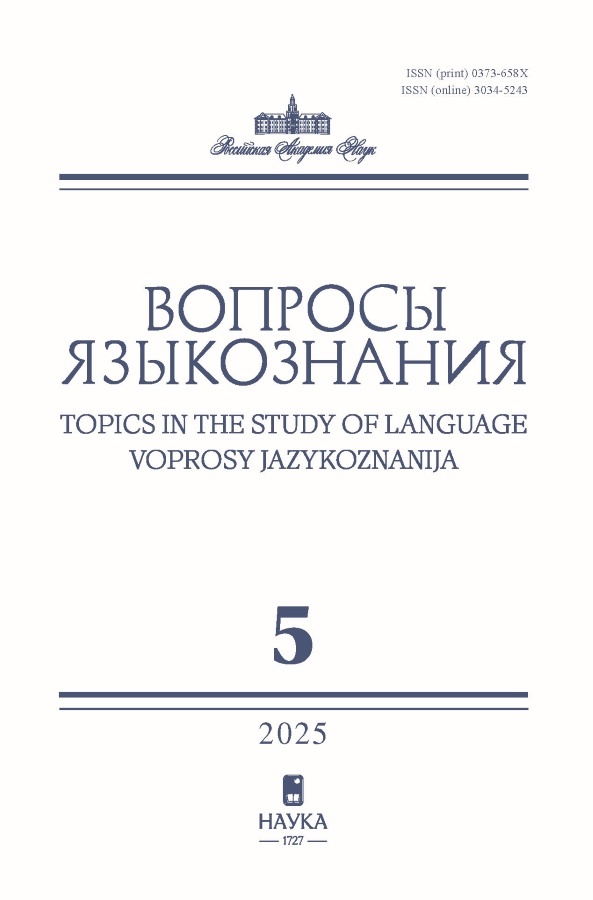The one who loves is loved: Adjectives of emotional attitude with conversive polysemy in Russian
- Авторлар: Levontina I.B1
-
Мекемелер:
- Vinogradov Russian Language Institute, Russian Academy of Sciences
- Шығарылым: № 5 (2025)
- Беттер: 143-153
- Бөлім: Special issue in memory of Leonid L. Iomdin
- URL: https://kazanmedjournal.ru/0373-658X/article/view/691101
- DOI: https://doi.org/10.31857/0373-658X.2025.4.143-153
- ID: 691101
Дәйексөз келтіру
Аннотация
The article deals with Russian adjectives which can characterize both the subject and the object of an emotional attitude. This phenomenon in the verbal domain is usually described as lability. This type of metonymy is rarely attested in adjectives. However, it is very typical of adjectives denoting emotional attitude. Usually the senses ‘the one who is the subject of the feeling’ and ‘the one who is the object of the feeling’ are expressed by different words: ljubjaščij ‘loving’, vljublënnyj ‘in love’, nežnyj ‘tender’, laskovyj ‘affectionate’ characterize the one who loves, or their gestures, looks, voice, etc., whereas ljubimyj ‘beloved’, vozljublennyj ‘beloved’, dorogoj ‘dear’ describe the object of the feeling. However, there are cases when both meanings are expressed by one lexical unit. For example, the word ljubeznyj ‘amiable’ has the meaning ‘friendly’ (ljubeznaja sekretarsa ‘an amiable secretary’, on byl ko mne ljubezen ‘he was amiable to me’) or ‘dear’ (ljubeznyj drug ‘dear friend’), though the second meaning has become obsolete. The word milyj is freely used in contexts like mil mne ‘I like (somebody)’ and mil ko mne ‘(somebody) is friendly to me’. Often the adjective is ambiguous between two meanings: Eē mama očen‘ milaja ‘Her mom is very nice’, that is, rather cute or friendly; milaja ulybka ‘a nice smile’ is attractive or favorable. The adjective ljubovnyj ‘amorous’ used to have similar polysemy, but the passive meaning has been completely lost. I conclude that such polysemy is widespread and grounded in the language system. The described semantic shift also has typological parallels.
Негізгі сөздер
Авторлар туралы
I. Levontina
Vinogradov Russian Language Institute, Russian Academy of Sciences
Email: irina.levontina@mail.ru
Moscow, Russia
Әдебиет тізімі
- Apresjan Yu. D. Izbrannye trudy [Selected works. Vol. 1: Leksicheskaya sematika. Sinonomicheskie sredstva yazyka
- Apresjan V. Yu., Gronas M. B. What is a metaktant and what does it eat us with? Skladchina: Collection of papers on the 50th anniversary of Professor Mikhail S. Makeev. Krasnosel’skaya Yu. I., Fedotov A. S. (eds.). Moscow: OGI, 2019, 11–26.
- Jespersen O. Filosofiya grammatiki [Philosophy of grammar]. Passek V. V., Safronova S. P. (transls.), Il’ish B. A. (ed.). Мoscow: Press of Foreign Literature, 1958.
- Es’kova N. A. Lexicographic notes. (Submission of the adjectives znakomyj, solёnyj, celyj). Avanesovskii sbornik. On the 100th birthday of Ruben I. Avanesov. Мoscow: Nauka, 2002, 396–400.
- Letuchiy A. B. Tipologiya labil’nykh glagolov [A typology of labile verbs]. Moscow: Yazyki slavyanskoi kul’tury, 2013.
- Mikhailova T. A. Gaulish cara vs. Latin cara: Towards the problem of archaic semantic syncretism. Voprosy Jazykoznanija, 2015, 5: 120–135.
- НКРЯ — Национальный корпус русского языка [Russian National Corpus]. http://www.ruscorpora.ru.
- Pokrovskii M. M. Materials for a historical grammar of Latin. Izbrannye raboty po yazykoznaniyu. Pokrovskii M. M. Moscow: Press of the Academy of Sciences of the USSR, 1959, 171–368.
- Perls F. Ego, golod i agressiya [Ego, hunger, and aggression]. Kedrova N. B., Kostrikov A. N. (transl.), Khlomov D. N. (ed.). Moscow: Smysl, 2000.
- Ptentsova A. V. Utru knęzju krovavyja ego rany na žestocěmъ ego tělě: What does Igor’s žestokoe tělo mean? Ot sorochka k Olekshe. Collection of papers on the 60th anniversary of Aleksei A. Gippius. Mikheev S. M. (ed.). Moscow: DELO, 2023: 166–175.
- Revzin I. I. On the general-semiotic interpretation of Propp’s three postulates (analysis of the fairy tale and the theory of text coherence). Tipologicheskie issledovaniya po fol’kloru. Collection of papers in memory of Vladimir Ya. Propp. Meletinskii E. M., Neklyudov S. Yu. (comps.). Moscow: Nauka, 1975, 77–91.
- Sandakova M. V. Metonimiya prilagatel’nogo v russkom yazyke [Metonymy of the adjective in Russian]. Doctoral diss. Moscow: Moscow State Pedagogical Univ., 2004.
- Tolstaya S. M. Gluhoj ‘deaf’ and slepoj ‘blind’. Prostranstvo slova. Leksicheskaya semantika v obshcheslavyanskoi perspektive. Tolstaya S. M. Moscow: Indrik, 2008, 134–174.
- Brosin 1952 — Brosin H. W. Contributions of psychoanalysis to the study of the psychoses. The impact of Freudian psychiatry. Alexander F., Ross H. (eds.). Chicago: The Univ. of Chicago Press, 1969, 178–199.
Қосымша файлдар









